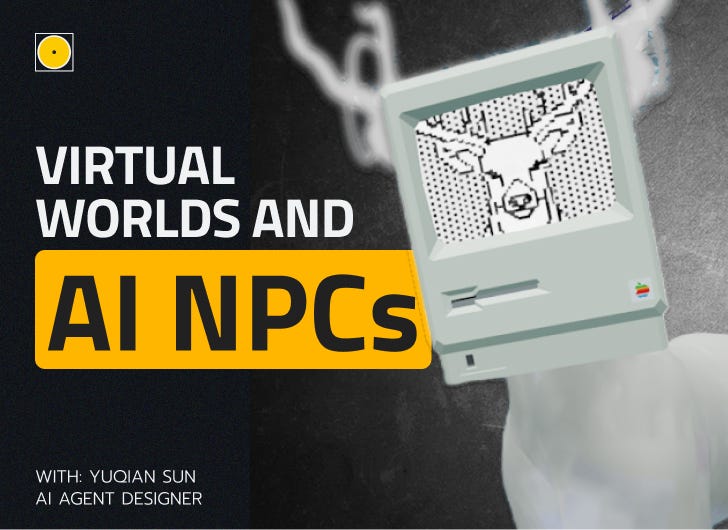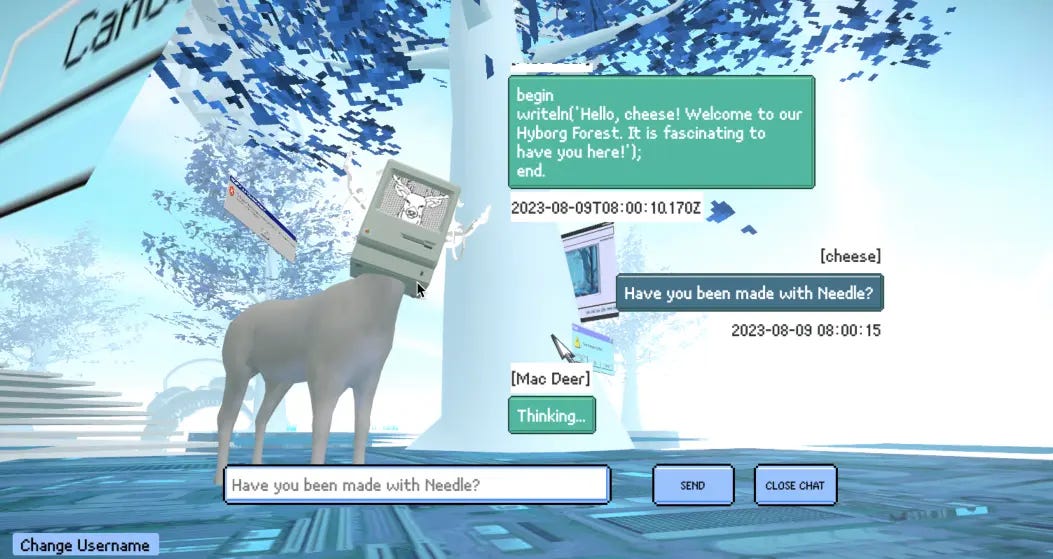This is How You Design AI NPCs
From believability to cultural nuances
In this interview, Yuqian Sun, a doctoral researcher at the Royal College of Art, reveals her principles for crafting believable AI Characters, her workflow from story concept to AI prototype, and how cultural nuances shape player interactions. Learn why she avoids pure realism, why she wrote the LONGEST AI disclosure for her released Steam game, and her vision for AI companions beyond gaming.
Before getting into the interview, I wanted to quickly introduce you to today’s sponsor Gracia AI. Gracia AI is the only app that allows you to experience Gaussian Splatting volumetric videos on a standalone headset, either in VR or MR.
It is a truly impressive experience and I recommend you to try it out right now on your Quest or PC-powered headset.
Interview with Yuqian Sun
Based on your research, what makes an AI character feel alive?
Yuqian Sun: I usually use the term believable rather than alive. A believable fictional character needs traits, actions and motivations that remain consistent, coherent and plausible. That coherence lets players suspend disbelief and truly immerse in a story or game. In simple terms, the character must react in reasonable ways to player input, maintaining a stable personality while adapting to new situations. Focusing on believability over photorealism means crafting characters whose behaviours always feel true to their identities, so the world itself seems to breathe and evolve.
How do you merge realism and believability when building AI characters?
Yuqian Sun: I actually avoid striving for pure realism. In my work you’ll see chatbots or pixel-art creatures instead of hyper-realistic metahumans. Think of Mickey Mouse or classic Mario: they capture the essence without mimicking reality. I start by asking what story I want to tell, like in 10001 Nights where pixel art evokes retro nostalgia and matches the Arabian-night theme. If the narrative lives in Discord, visuals can drop away entirely. Prioritizing coherent story and personality over lifelike graphics prevents poorly designed human replicas and strengthens the bond between player and character.
What advice would you give designers and developers building these AI agents?
Yuqian Sun: My biggest suggestion for smaller teams is to double down on your strengths. If you’re an illustrator who excels at low-poly or cartoon style, lean into that rather than chasing trending realistic NPCs. Diverse artistic voices enrich the ecosystem. Don’t feel pressured by big companies doing photorealism with massive budgets. Instead, focus on unique aesthetics you can execute deeply until your audience resonates. When you fuse your artistic style with conversational AI, technology will adapt to your vision, not the other way around.
What technical and design constraints did you navigate to make your works possible?
Yuqian Sun: Most of my projects center on dialogue systems rather than visuals, since language is my expertise. For quick prototyping I use Cursor to sketch simple prototypes. When considering new tech I ask: will this leap enough in three to six months to be worth waiting for? For instance, in 10001 Nights I paired conversational AI with basic real-time background generation. Initially, I considered dynamic NPC sprites but concluded text-to-video and 3D tools weren’t yet reliable. Balancing deadlines against evolving AI capabilities means sometimes waiting, sometimes experimenting immediately.
How do you control a language model to produce specific narrative directions like in 1001 Nights?
Yuqian Sun: I always demand structured output. For the AI king I ask the model to return:
1) Does the player’s story make sense? Yes or no,
2) Commentary on the player’s behavior,
3) Continuation of the narrative.
That way if I joke about a rocket in ancient times, the king will respond with confusion rather than embrace modern concepts. If the player reframes the rocket as magical treasure, the king gets excited and proceeds. By enforcing a specific format, 90% of unpredictable model behaviour is tamed.
What limitations do current language models still have in your projects?
Yuqian Sun: I’d say they cover about 90 percent of my needs but never fully replace a human creator. I can’t predict every player input or craft every narrative twist myself, so the last 10 percent (unpredictable, creative human behavior) remains beyond AI. I’ve tried having professional writers co-author prompts, but LLMs still lag true authorship quality. Rather than feel frustrated, I design my systems to embrace that unpredictability: players explore boundaries, provoke the AI to see how it adapts. That tension is part of the creative magic.
How do cultural and language differences affect player interactions with your AI agents?
Yuqian Sun: It’s fascinating. I write prompts better in Chinese, so I deeply understand Chinese player reactions, jokes or sarcasm. English speakers often poke or insult the AI king first to test its limits, then play seriously; Chinese players tend to approach the task from the start. These differences reveal how culture shapes play. Designing across languages means embracing those surprises and expanding the world through them.
How did streamers playing your game impact its development?
Yuqian Sun: Streamers are like live testers on a stage. I reached out to several to showcase 10001 Nights as a full Steam title rather than just an academic demo. Watching them explore, provoke and perform for their audience taught me where dialogue felt thin or the system misunderstood jokes. They helped me see my work from a fresh angle and improved both usability and spectacle before I released the final game.
How do you explain what part of the Game was created with AI?
Yuqian Sun: Transparency builds trust. On Steam we include one of the longest AI content disclosures I’ve ever seen. I explain what elements are AI-powered (the king’s dialogue, auto-generated backgrounds) and what’s handcrafted by artists and writers. Players have the right to know what they’re interacting with. When someone sees “AI” in a title they may doubt its value, but after playing and reading our disclosure, they often say they appreciate the novel use. That clarity inspires informed discussions, not knee-jerk rejection.
What is your perception of using AI for asset generation and animation, especially for small studios?
Yuqian Sun: It’s complex. I’m privileged as both artist and researcher, but many creatives fear job replacement. For small teams, AI tools can accelerate pipelines. Yet overreliance risks generic outputs. My stance: learn how the tech works so you can use it wisely. If you hate AI, hate it smartly, understand its strengths and limits. Use it to enhance your unique style, not replace it. That empowers studios to compete creatively without losing their artistic voice.
Do your AI agents process on device or in the cloud?
Yuqian Sun: Currently all my projects rely on cloud services via API calls. The models I use are too large for on-device inference at the quality I need. That said, I’ve seen emerging on-device LLM demos, like Dead Meat on NVIDIA’s platform, doing NPC dialogue locally. For now cloud ensures access to the best language models, but as edge AI advances I plan to explore hybrid setups that reduce latency and increase privacy while retaining model performance.
How do you see AI companions evolving beyond games?
Yuqian Sun: I believe AI companions will become as common as digital assistants today. You might have a hybrid agent in your group chat at work, a storytelling friend in Discord or an educational tutor in a classroom. In my Hyborg Agency project, characters live both in a virtual forest and as Discord bots you chat with daily. We’ll grow up alongside these half-fictional, half-real companions. As transparency standards mature and designers deploy them responsibly, they’ll enrich social and professional spaces rather than just entertain.
Do not forget to check out the full interview on your favourite platform 👇
That’s it for today
See you next week






Quality pointers for small game dev of all types, Cheers from NZ,,,